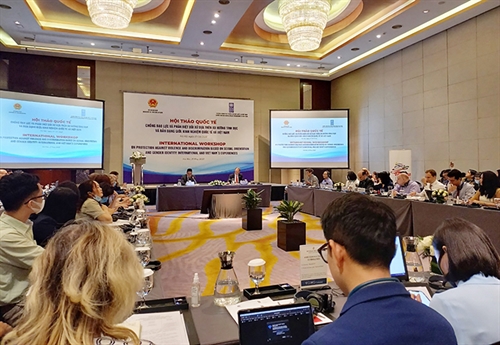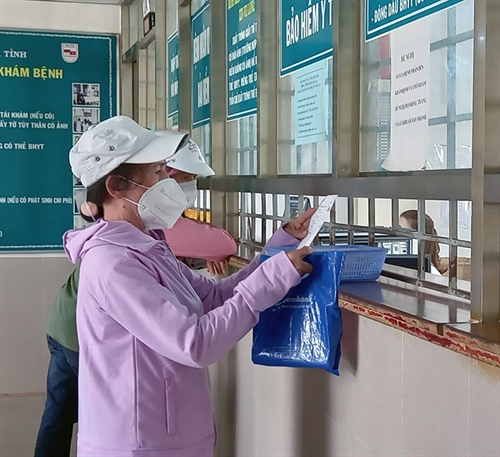 |
| Units owing social insurance premiums work with the Hanoi Municipal Inspectorate__Photo: VNA |
Nguyen Thi Huyen, a factory manager of Haprosimex Knitting Factory - a subsidiary of Haprosimex Group JSC. had to spend six years to claim for payment of social insurance benefits for herself and other workers under her management which were retained by social security agencies due to their employer’s failure to pay insurance premiums for employees since 2011.
Recalling the arduous journey of claiming for her legitimate interests, which started in 2017 and just ended in March this year when her company managed to pay its social insurance premium debts of VND 15 billion, Huyen told the online magazine Vnbusiness she had met and questioned both former and incumbent leaders of the company once and again but just received an insensitive answer: “The company is in difficulty and has no money [to pay social insurance premium debts].”
Huyen was among nearly 500 workers of Haprosimex Knitting Factory who were affected by the company’s indebtedness to the social insurance fund. Since 2011, Le Thi La, another employee of the company, had given birth twice but received no maternity benefits. Her younger sister, Le Thi Ngan, unfortunately passed away in 2012, but her family had to wait until March 2023 to receive the survivorship allowance.
Haprosimex Knitting Factory was not the only business that fails to fulfill the obligation to pay insurance premiums for employees. In the central province of Thua Thien-Hue alone, by September 2023, there are more than 3,000 units and businesses having social insurance premium debts, the Tien Phong reported.
According to a report from the Ministry of Labor, Invalids and Social Affairs, by the end of October 2023, the total amount of late-paid and evaded social insurance and unemployment insurance premiums was roughly VND 14,650 billion, a considerable increase from the average amount of about VND 10 trillion per year during the 2016-22 period.
Causes and proposed remedies
There are many reasons, both subjective and objective, for the above situation.
First of all, the business community has encountered enormous difficulties over the past few years. The outbreak of the COVID-19 pandemic and ongoing conflicts around the world have exerted adverse impacts on production and business activities of enterprises, particularly those engaged in export processing, and some of them had to terminate operation or file for bankruptcy. Moreover, in case a business terminates operation or goes bankrupt, its social insurance debt, if any, is not ranked first but below a lot of other items such as bankruptcy cost, wage debt, and severance pay in the priority of payments. On the other hand, proceeds of the liquidation of assets of businesses that have gone bankrupt or discontinued operation in most cases are insufficient to pay their social insurance and unemployment insurance premiums debts.
However, while not a few enterprises fall into debt due to difficulties in production and business activities, there are some others that deliberately delay or evade payment of insurance premiums for employees for self-seeking purposes, “profiting on workers’ pain” as said by Vice President of the Vietnam General Confederation of Labor Ngo Duy Hieu.
There exists a paradox that many employers fail to fulfill their obligation to pay insurance premiums for employees but none of them has been criminally handled.
The Vietnam Social Security, in a document recently issued in response to the Ho Chi Minh City voters’ question about social insurance-related issues, cites the existence of different understandings of the Penal Code’s provision on the crime of evading payment of social insurance, health insurance and unemployment insurance premiums for employees as the reason behind that paradox.
Under Article 216 of the 2015 Penal Code, revised in 2017, an employer who is obliged to pay social insurance, health insurance and unemployment insurance premiums for employees will be examined for penal liability if it/he/she commits a deceitful act or employs another trick to evade paying or insufficiently pay premiums according to regulations for six months or more with an evaded premium amount or a number of affected employees execeeding the law-prescribed threshold or although has been administratively sanctioned for this act. Article 2.10 of Resolution 05/2019/NQ-HDTP, of the Judicial Council of the Supreme People’s Court guiding the implementation of the Penal Code’s provisions on social insurance-related crimes, defines the act of evading payment of insurance premiums mentioned in Article 216 of the Penal Code as employers’ committing a deceitful act or employing another trick in order to not pay or fully pay insurance premiums for employees.
It seems at the first glance that legal foundations for criminal handling of employers who fail to pay insurance premiums for employees are quite sufficient. However, reality is more complicated. The Vietnam Social Security admits that it is facing many difficulties in identifying whether an employer who fails to pay insurance premiums for employees commits the act of “evading payment of insurance premiums” as it has yet provided with any tools or methods to prove that such employer “commits a deceitful act or employs another trick to evade payment of insurance premiums” as guided in Article 2 of Resolution 05/2019/NQ-HDTP.
As for cases in which the evaded premium amount or the number of affected employees is smaller than the threshold for examination of penal liability, under Article 216 of the Penal Code, a violator will only be subject to criminal handling if it/he/she has earlier been administratively sanctioned for “this act”. The question here is which act is “this act”. Some say “this act” means the act of “failing to pay or insufficiently paying insurance premiums as prescribed while others interpret “this act” as “act of evading payment of insurance premiums”. Furthermore, as there are currently no provisions on sanctioning of managers, executives and legal representatives of units and businesses for administrative violations related to payment of insurance premiums for employees, these persons are naturally exempt from penal liability under Article 216 of the Penal Code.
The Vietnam Social Security is now proposing functional agencies to amend regulations on sanctioning of violations related to evasion of insurance premium payment with a view to ensuring consistency between the administrative law and the criminal law in handling these violations.
Worthy of note, new regulations clarifying acts of delaying or evading payment of insurance premiums have been added to the latest draft for the revised Law on Social Insurance. The draft Law also increases penalties for employers committing such acts. In addition to having to pay fines on the late-paid or evaded insurance premium amount on a daily basis, employers who have been administratively sanctioned but still repeat their violation would be banned from using invoices if delaying or evading insurance premium payment for six months or more. Particularly for legal entities that violate regulations on payment of insurance premiums for employees for a period of 12 months or longer, their legal representatives or persons authorized to exercise the rights and perform the obligations of legal representatives would be subject to exit postponement in accordance with the Criminal Procedure Code.-









